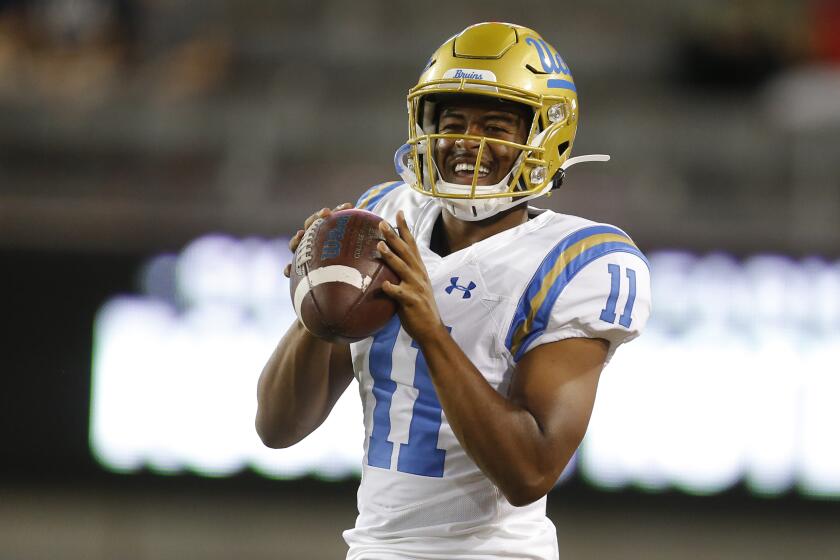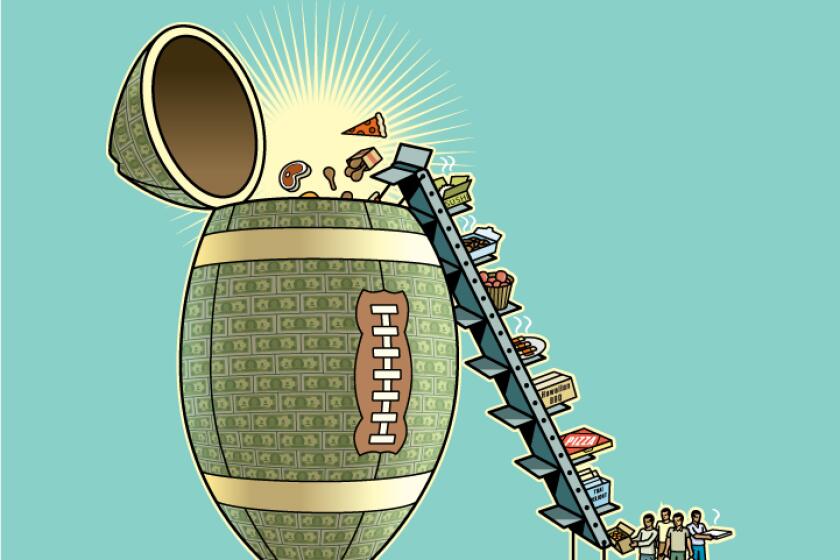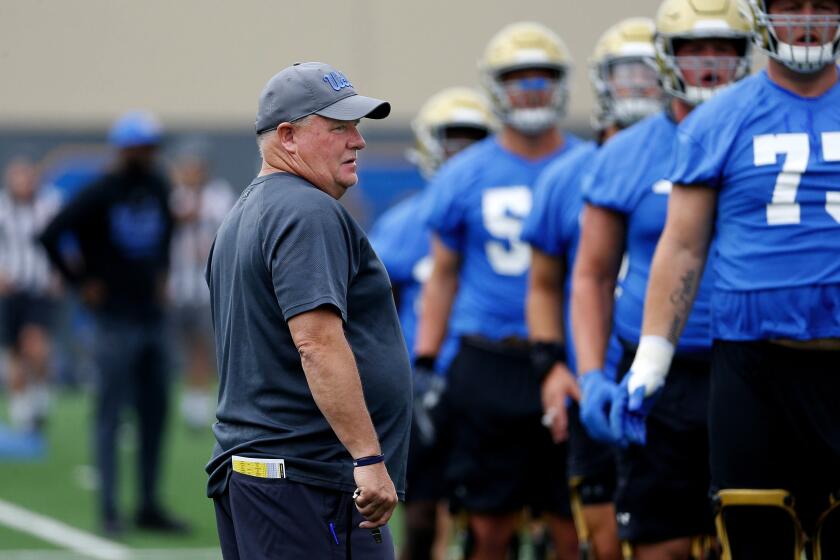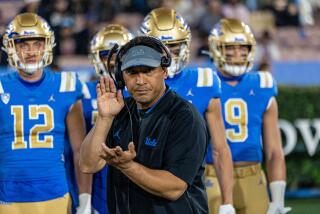Entitled to help UCLA’s defense, Brian Norwood wants to fix what’s wrong
- Share via
Growing up the nephew of an award-winning Washington Post reporter who would bring him into the newsroom, allowing him to marinate in a noble quest for truth, Brian Norwood understands the importance of accuracy.
He’s spent much of the last year setting the record straight.
One buddy saw that Norwood was listed as UCLA‘s new passing game coordinator upon his hiring in January after decades spent coaching defense and called to congratulate him on moving to the other side of the ball. Sorry, Norwood had to tell him, it’s defensive passing game coordinator.
Others believed he had become the Bruins’ co-defensive coordinator alongside Jerry Azzinaro after his Twitter biography briefly listed that title. My bad, Norwood told anyone who inquired. He just forgot to update it after holding that position during previous stops at Navy, Kansas State and Tulsa.
Then there were the UCLA fans who noticed the tweaks the team had made on defense in the spring and the new terminology players were using in interviews. They insisted on message boards that Norwood was part of a covert transition in which he would take over the defense while allowing the beleaguered Azzinaro to retain his title in name only.
Norwood has three words for anyone saying he has become UCLA’s de facto defensive coordinator.
Chase Artopoeus and Chase Griffin, two redshirt freshmen from Ivy League schools, are battling for UCLA’s No. 2 QB spot behind Dorian Thompson-Robinson.
“No, no, no,” said Norwood, who turned 55 this summer. “Not no de facto coordinator. I’m Brian Norwood, pass game coordinator and just assisting this great staff.”
Officially, his title is assistant head coach-passing game coordinator-defensive backs coach, a lengthy designation that comes with a hefty $500,000 salary this season. He’ll be worth every penny if he can help UCLA revive a defense that’s been among the worst in college football under Azzinaro, finishing No. 102 nationally in 2018 and No. 113 in 2019 while dragging the Bruins toward a combined 7-17 record in those seasons.
Several players have acknowledged the team is moving to more of a 4-2-5 defense that’s similar to the one Navy ran under Norwood last season, when the Midshipmen brought running games to a standstill and finished No. 16 nationally in total defense. They also matched a school record with 11 victories and defeated Kansas State in the Liberty Bowl.
Confirmation of UCLA’s switch came earlier this month when Navy defensive coordinator Brian Newberry, the architect of the scheme that Norwood helped implement last season, indicated that the Bruins were installing something comparable. Newberry said he had “a lot of discussions” with Azzinaro during the initial COVID-19 lockdown period and expected Norwood to further explain the nuances of a defense that would combine their philosophies.
“I think they’re looking to merge some of the things that we did last year and had some success with,” Newberry said. “I think it will be a nice blend of what [Azzinaro] has done in the past combined with some of our concepts.”
UCLA coach Chip Kelly has pooh-poohed any sort of transformation, saying his team’s defense will closely resemble the nickel packages it increasingly used last season while facing spread offenses.
But a tipoff that changes were afoot came in spring practices when the team commenced position drills for a hybrid safety-linebacker spot known as a “striker” that’s a staple of the 4-2-5 defense.
Whatever the Bruins are running, it’s energized them in training camp. Safety Quentin Lake said Norwood has simplified the defense, allowing players to unleash a faster and more physical attack.
“The biggest thing for me is he allows us to go out there and be free, have a little fun,” Lake said, “and I think for a lot of the guys he’s brought fun back to football.”
That joy has translated to misery for the UCLA offense, which hasn’t enjoyed its usual training camp success.
Said quarterback Dorian Thompson-Robinson, entering his third season with the team: “This is the best I’ve seen [the defense] so far. These guys are giving me really good trouble.”
Said tight end Mike Martinez: “They have a lot of juice and their mentality is just kill, kill, kill. They bring it every single play.”
The 4-2-5 defense prioritizes speed at every position. Defensive linemen and linebackers funnel running backs toward defensive backs, who are expected to make a generous number of tackles. Cornerbacks apply tight coverage, providing additional opportunities to make plays on the ball.
Offenses are left to guess which defenders will drop into coverage and which will rush the line of scrimmage. Pressure comes from different positions on any given play. Confusion among quarterbacks often ensues.
As the centerpiece of a department facing a growing deficit, UCLA football has gorged itself on food spending that has no rival nationwide.
“You never know where the blitz is coming from,” Navy senior cornerback Cameron Kinley said. “It’s a lot of disguise, a lot of changing the shells and coverages, playing like two different coverages at once, so it keeps the offense on their toes, it keeps the quarterbacks scanning.”
Navy’s success made Norwood a coveted commodity who topped Kelly’s list of potential assistant candidates. The Bruins coach surreptitiously scouted him during the Midshipmen’s Liberty Bowl practices and found that he liked his teaching style and the warmth he conveyed with the players. Norwood didn’t know he was being courted until after the bowl game, when Kelly engaged him about the possibility of coming to UCLA.
“Chip’s a good guy, sort of matter of fact,” Norwood said, recalling Kelly’s pitch. “ ‘Hey, I have an opportunity, why don’t you come out and take a look at it?’ ”
As he considered his life’s arc, Norwood realized he had always been searching for a way to get to Westwood. UCLA was among a handful of college teams he enjoyed watching on television growing up and its blue-and-gold uniforms matched those of the youth teams he played on in Glenarden, Md., a suburb of Washington.
“I always thought as a kid growing up in Glenarden that UCLA would be a pipe dream, like ain’t no way in the world I can go to college out there,” said Norwood, who went on to play defensive back at the University of Hawaii. “I’ll dream about it.”
He fulfilled one fantasy when he met Kenny Easley, the Bruins’ All-American safety, as a teenager. The encounter came courtesy of Norwood’s aunt Athelia Knight, a longtime Washington Post reporter and Pulitzer Prize finalist who spent part of her career in the sports department. After hearing about a sports camp that she thought her nephew might enjoy, Knight arranged for a college buddy to drive him there so that he could meet Easley.
“It made my world,” Norwood said.
UCLA has not reported a positive COVID-19 test in its athletic community since Oct. 2, but it needs opponents to ward off the disease as well.
Norwood has returned the favor in his 30 years as a college coach, inspiring a legion of players with more than a swarming defensive philosophy that centers on relentless effort. While addressing the Midshipmen the night before games, Norwood favored a Bible verse about a threefold strand not being easily broken, conveying the need to stay together amid adversity.
The coach also led players in spirited renditions of “Lean on Me,” a favorite that he and his friends had sung many years earlier at high school assemblies.
“It definitely got the team going and brought us closer,” Kinley said. “Those were some of my favorite nights.”
UCLA players said they have bonded since Norwood’s arrival after participating in backpack and food giveaways the coach helped organize, making the Bruins realize the ways they can support those in need.
Just how heavily the Bruins will lean on their new assistant remains one of the biggest questions heading into the season opener against Colorado on Nov. 7. Norwood insisted that the team is running Azzinaro’s defense and said the scheme involved a collaborative process, just like it did at Navy.
“There’s one coordinator,” Norwood said, “and at the end of the day it’s going to be his plan, his vision, and we put things together to help each other.”
Having gone on the record about the matter, he won’t have to correct it.
More to Read
Go beyond the scoreboard
Get the latest on L.A.'s teams in the daily Sports Report newsletter.
You may occasionally receive promotional content from the Los Angeles Times.














